
Anand Madhvani, Journal Letter No.7 - Jun 2004
Dear Friends,
The morning of April 14th was sunny and warm in Johannesburg, where people were out early forming long queues to vote. Millions across this vast, diverse country did the same. The atmosphere at the two polling stations I visited was tranquil, thoughtful, friendly and quietly dignified, proud of what they were doing. The world's media had turned out in force to record South Africa's third free and fair election on the anniversary of ten years of democracy, yet struggled to find anything to report. It was, in short, an amazing triumph.
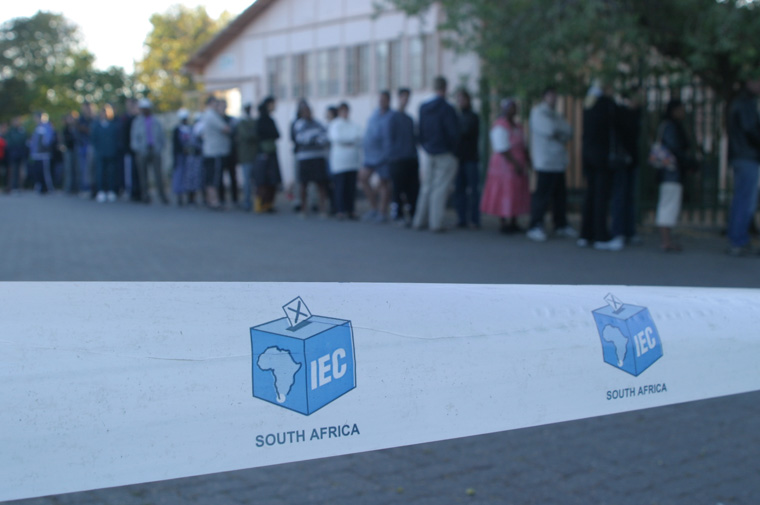
voters in patient queues - Johannesburg suburbs
To understand why, spend a morning in Johannesburg Public Library going through news cuttings from the first election. They describe a country I hardly recognise. Only ten years ago the new flag was unveiled, but it was unclear if the country could even hold together. Key groups only decided to take part in the election at the last minute - white Afrikaaners; Buthelezi's Zulu IFP in Natal; Mangope's Tswana 'homeland' of Boputhatswana.
UN Peacekeepers and election monitors were present in force, and there were campaigns to educate the 16 million new voters on how to make their first democratic choice. Violence between hostels was anticipated - some areas were simply 'no-go'. Intimidation was expected, especially on rural white-owned farms and in the townships. Bombs went off in town before voting started, not far from where I now sat reading about them in the library.
Changing the South African flag now would be unthinkable, this country having given the world an enormously proud symbol of unity and reconciliation over the past decade. This time violence was negligible, there were no 'no-go' areas, and the ANC won control of all the provinces for the first time, with 'race-based' parties facing marginalisation. South Africa finally came of age, now that elections are a fairly dull event, as they are elsewhere! How has this happened in such a short time? The answers are many and complex, better dealt with elsewhere. I'd like instead to share some personal observations on reconciliation with the past, and some small but important indicators of social change.
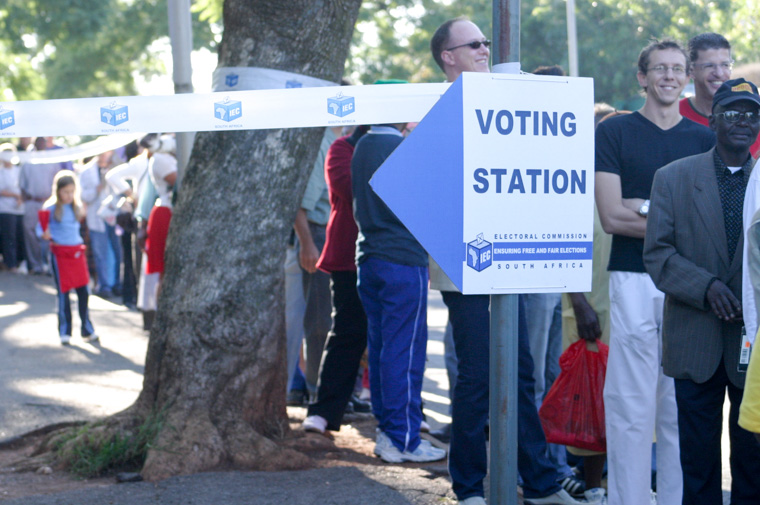
A small, rather innocuous hill, stands at the heart of Johannesburg, nestling between the high-rise offices of Braamfontein and the cosmopolitan 'flat-land' of Hillbrow, just north of the Central Business District skyscrapers. The surrounding tall buildings hide the hill, which few people have seen, or know much about. That low profile is about to change.
Once the hill was far more visible, an imposing presence over the young settlement it commanded a view over. It peered beyond the changing horizon of mine-dumps on the gold reef to watch for British troops. That is, after all, what the hill was built for - as a fortress and vantage point to defend newly-discovered Afrikaaner riches from the uitlanders.
The British took the fortress, and the Fort it contained, which they turned into a prison for criminals, and those who resisted or fell foul of the race laws (including Mahatma Gandhi). The apartheid government continued this use, extending the now notorious prison, whose inmates would include Robert Sobukwe and Nelson Mandela before it closed in the 1980s.
Under the new South Africa, the hill is again about to provide an important view, but this time one of history. Renamed Constitution Hill, it now houses the new Constitutional Court, safeguarding the rights of every South African - the antithesis of the prison from whose bricks it was deliberately built, to show that a better future can be built from the past. A new visitors centre is also opening to explain the history and importance of the site.
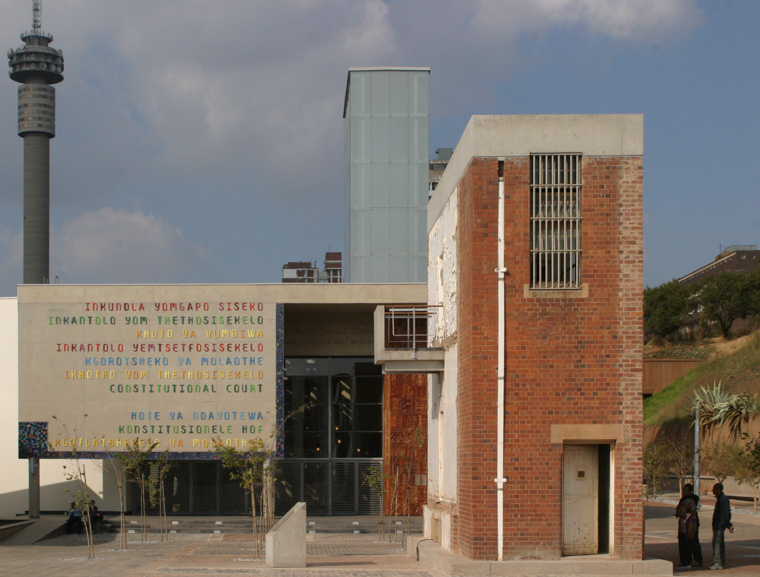
Museums like this not only help South Africa face a difficult past, but also move on from it. I see that in the African-American visitors we host in Soweto. They feel more bitterness against a history of slavery which affected their forefathers, than local people do against the apartheid they themselves lived through. I see it in the young Palestinian who cuts my hair, fuming against historical British actions in the Middle East, which helped create the current mess. The public acknowledgement of past wrongs is something South Africa can at least do, having made a clear break with that past, and it is essential for the healing of past hurts.
A few weeks ago I had my first experience of a big local soccer match, and this was the biggest South Africa has to offer - Orlando Pirates against Kaiser Chiefs, deadly local rivals. The vast FNB stadium outside Soweto filled up past its 80,000 capacity, and we were both deafened and exhilarated by the noise. It was also interesting that I didn't feel out of place watching this fixture between two 'Soweto' teams, and neither did the small groups of white, coloured and Indian supporters I saw.
Legal apartheid died in 1994, but cultural apartheid is also slowly eroding. Johannesburg is moving faster in this regard than other cities, and in the rural areas it can feel like nothing has moved on at all. Yet things are gradually changing.
With the first free and fair democratic elections, millions of white South Africans celebrated by packing their bags and getting out. Johannesburg Central Business District went from all-white to nearly all black, as a frightened white capital moved out to new 'safer' areas, building whole new cities from scratch if necessary. Apartheid had forcibly created dense black townships packed full of identical 'matchbox' houses, surrounded by security cordons and sited at a safe distance from the white cities. The end of white rule bizarrely reversed this trend, with people choosing to move to new, boxy, equally soulless 'secure complexes' huddled behind security cordons, sited at a safe distance from the newly black cities.
Some suburbs are now becoming genuinely mixed, as are workplaces. The inner city has started to regenerate with a whole new cultural development, rents are rising again and businesses moving back. More people are visiting townships they would have seen as no-go areas a decade ago, to connect with their new friends, workmates and neighbours.
A few of those who left are also now coming back, the exodus ending. A recent local blockbuster at cinemas was by Leon Schuster, an Afrikaaner comedian who somehow manages to combine the slapstick of Benny Hill with the biting social insight of early Ben Elton, using 'Candid Camera' style set-ups. It ends with a planeful deciding not to emigrate to Australia mid-flight, amid tears and cheers, much flag-waving and, of course, the national anthem. The moral: despite all the crime and frustrations, life can still be good here.
With the recent decision that South Africa will host the 2010 World Cup, a slogan for one prominent AIDS awareness campaign will take on new meaning - '2010 : Love to be there' I myself would love to be there, to catch up again with this amazing, dynamic country.
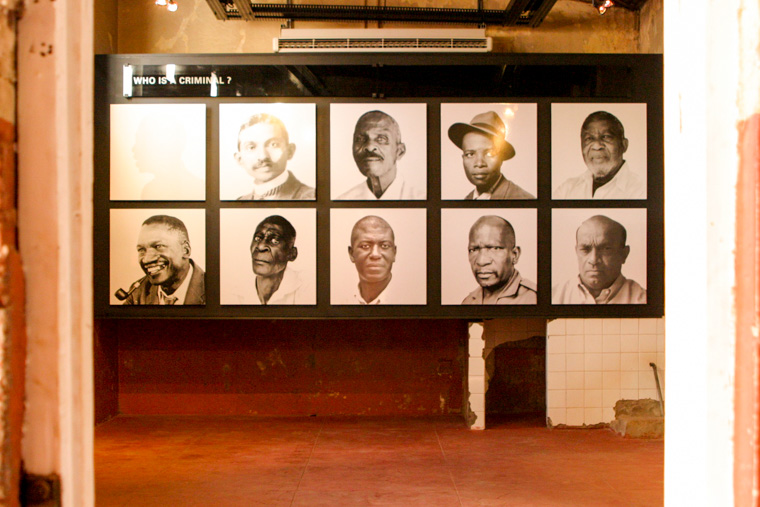
some famous and less well-known people once held at the Fort by the British
Gandhiji's political awareness grew in South Africa, though his focus was on Indian interests
and few people now know he was involved in local football leagues as well!
My own time in South Africa now draws to a close; my next Journal Letter will be my last.
I am concentrating on finishing work in progress, and the handover of systems and processes. The main school township intervention I have been involved with has now trained over 400 learners, educators and parents from the area on AVP (nonviolence) courses. Just as importantly, the team of facilitators at the school ran two workshops last week independently of my support, with twelve more scheduled for this year.
I assisted our new team of facilitators in Cape Town with some of their first workshops independent of our established base in Johannesburg, which was also interesting and satisfying, as I watched them grow in confidence. It also provided a useful reminder of how many things are needed for a successful workshop to happen, through hearing their questions and seeing the practical requirements of a new team again.
My organisation is scaling up its AVP work, which brings both opportunities and problems. Over the last year, I have been working on systems to 'industrialise' our workshops without losing their essential basis in building human relationships. This involves simplifying and streamlining administrative tasks, while also empowering our facilitators and 'team leaders'. As well as packs of standard materials for the workshops, our new website is a key system for managing workshop schedules, facilitator details and skills development. 4 Other parts of our work are community-based tourism (in Soweto and rural areas) and courses in African languages. These support local communities, enrich the lives of clients, and provide sources of funds to cross-subsidise our work in disadvantaged communities. I'm also busy finishing new publicity materials and advertising, to help ensure the tourism and commercial sides of our work also continue to grow.
At Easter I attended Central and Southern Africa Yearly Meeting (C&SAYM), which was held in Lesotho this year. I've met many of the Quakers in the region, through both Meeting for Worship and AVP workshops, which several are involved with. It was a lovely opportunity to see some of them again, perhaps for the last time. Local Quakers have provided me with a very rich, committed and supportive community during my time here. In June I will be part of a team running the first AVP workshop in Gabarone, on the invitation of Botswana Quakers, who would like us to spread our work there.
A final focus of my remaining time will now be, of course, planning what I do next. One possibility is moving on to eastern Africa, to begin establishing an AVP programme there. I already have connections with Kenya, where I was born. With recent political changes there, it might be a good time to introduce this kind of community programme.
I am looking into options, possibilities of funding, and networks of contacts and support, including the substantial Quaker communities in eastern Kenya, and working through the Quaker Prevention of Violent Conflict Network (QPN).
We have already found that practical lessons learnt and systems developed here, in South Africa, can be usefully exported and adapted to support new programmes elsewhere. The umbrella organisation, AVP International, is so interested in our model and successes that we have been asked to host the next international gathering in 2006 here in South Africa.
In this, as in so many things, it seems a lot can be learnt from people's experiences in this part of the world.
with best wishes,
Anand
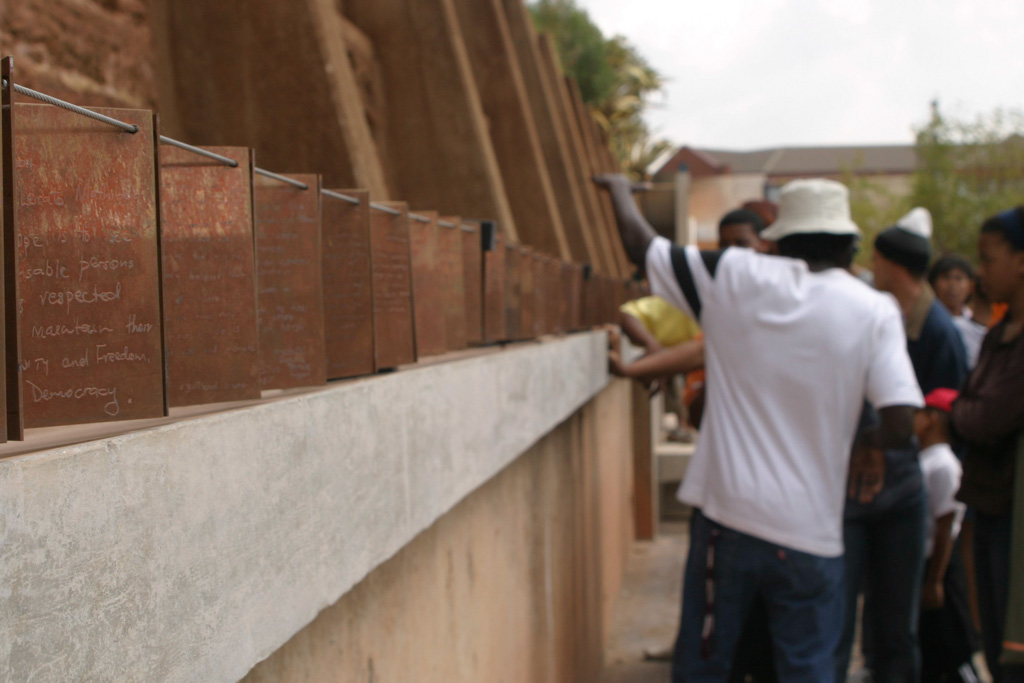
 ⥢
⥢
 ⥤
⥤